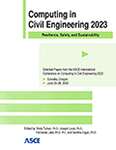Personalized Thermal Comfort Model for a Multiple Occupancy Office Building
Publication: Computing in Civil Engineering 2023
ABSTRACT
Building occupants have different thermal comforts at the static indoor set-point temperatures due to inter- and intra-individual differences in preferences, needs, and activities. Despite advances in intelligent building management/control systems, occupants’ dissatisfaction with the indoor thermal environment is still widespread. This study developed a personalized thermal comfort model to predict individual thermal preferences in multiple occupancy. The proposed model integrates both physiological signals (e.g., heart rate, skin temperature, and skin conductance) and environmental parameters (e.g., air temperature, relative humidity, and CO2) in the process of predicting individual thermal preferences. The collected data was trained through the proposed model using various machine learning-driven classification algorithms and sought the most reliable personalized predictive model. To evaluate the performance of the proposed model, a case study is conducted in multiple occupancies in an office building. The results demonstrate that each person has a different powerful classification model to accurately predict their thermal preferences.
Get full access to this article
View all available purchase options and get full access to this chapter.
REFERENCES
Arakawa Martins, L., V. Soebarto, and T. Williamson. 2022. “A Systematic Review of Personal Thermal Comfort Models.” Building and Environment 207.
Chaudhuri, T., Y. C. Soh, H. Li, and L. Xie. 2020. “Machine Learning Driven Personal Comfort Prediction by Wearable Sensing of Pulse Rate and Skin Temperature.” Building and Environment 170. doi: https://doi.org/10.1016/j.buildenv.2019.106615.
Guo, H., J. Zhou, and C. Wu. 2020. “Ensemble Learning via Constraint Projection and Undersampling Technique for Class-Imbalance Problem.” Soft Computing 24(7):4711–27. doi: https://doi.org/10.1007/s00500-019-04501-6.
Jazizadeh, F., A. Ghahramani, B. Becerik-Gerber, T. Kichkaylo, and M. Orosz. 2014. “Human-Building Interaction Framework for Personalized Thermal Comfort-Driven Systems in Office Buildings.” Journal of Computing in Civil Engineering 28(1):2–16. doi: https://doi.org/10.1061/(asce)cp.1943-5487.0000300.
Jung, W., and F. Jazizadeh. 2019a. “Comparative Assessment of HVAC Control Strategies Using Personal Thermal Comfort and Sensitivity Models.” Building and Environment 158:104–19. doi: https://doi.org/10.1016/j.buildenv.2019.04.043.
Jung, W., and F. Jazizadeh. 2019b. “Human-in-the-Loop HVAC Operations: A Quantitative Review on Occupancy, Comfort, and Energy-Efficiency Dimensions.” Applied Energy 239:1471–1508.
Kim, J., S. Schiavon, and G. Brager. 2018. “Personal Comfort Models – A New Paradigm in Thermal Comfort for Occupant-Centric Environmental Control.” Building and Environment 132:114–24. doi: https://doi.org/10.1016/j.buildenv.2018.01.023.
Kim, J., Y. Zhou, S. Schiavon, P. Raftery, and G. Brager. 2018. “Personal Comfort Models: Predicting Individuals’ Thermal Preference Using Occupant Heating and Cooling Behavior and Machine Learning.” Building and Environment 129:96–106. doi: https://doi.org/10.1016/j.buildenv.2017.12.011.
Lee, J., and Y. Ham. 2021. “Physiological Sensing-Driven Personal Thermal Comfort Modelling in Consideration of Human Activity Variations.” Building Research and Information 49(5):512–24. doi: https://doi.org/10.1080/09613218.2020.1840328.
Lee, J., and Y. Ham. n.d. Intra-Individual Differences in Predicting Personal Thermal Comfort Using Model-Based Recursive Partitioning (MOB).
Li, D., C. C. Menassa, and V. R. Kamat. 2017. “Personalized Human Comfort in Indoor Building Environments under Diverse Conditioning Modes.” Building and Environment 126:304–17. doi: https://doi.org/10.1016/j.buildenv.2017.10.004.
Li, D., C. C. Menassa, V. R. Kamat, and E. Byon. 2020. “HEAT - Human Embodied Autonomous Thermostat.” Building and Environment 178. doi: https://doi.org/10.1016/j.buildenv.2020.106879.
Liu, S., S. Schiavon, H. P. Das, M. Jin, and C. J. Spanos. 2019. “Personal Thermal Comfort Models with Wearable Sensors.” Building and Environment 162. doi: https://doi.org/10.1016/j.buildenv.2019.106281.
Yang, X., Q. Kuang, W. Zhang, and G. Zhang. 2018. “AMDO: An Over-Sampling Technique for Multi-Class Imbalanced Problems.” IEEE Transactions on Knowledge and Data Engineering 30(9):1672–85. doi: https://doi.org/10.1109/TKDE.2017.2761347.
Yuan, J., C. Wang, and Z. Zhou. 2019. “Study on Refined Control and Prediction Model of District Heating Station Based on Support Vector Machine.” Energy 189. doi: https://doi.org/10.1016/j.energy.2019.116193.
Information & Authors
Information
Published In
History
Published online: Jan 25, 2024
ASCE Technical Topics:
- Architectural engineering
- Building management
- Building systems
- Buildings
- Case studies
- Commercial buildings
- Engineering fundamentals
- Engineering mechanics
- Facilities (by type)
- Measurement (by type)
- Methodology (by type)
- Research methods (by type)
- Smart buildings
- Structural engineering
- Structures (by type)
- Systems engineering
- Systems management
- Temperature effects
- Temperature measurement
- Thermal analysis
- Thermodynamics
Authors
Metrics & Citations
Metrics
Citations
Download citation
If you have the appropriate software installed, you can download article citation data to the citation manager of your choice. Simply select your manager software from the list below and click Download.
